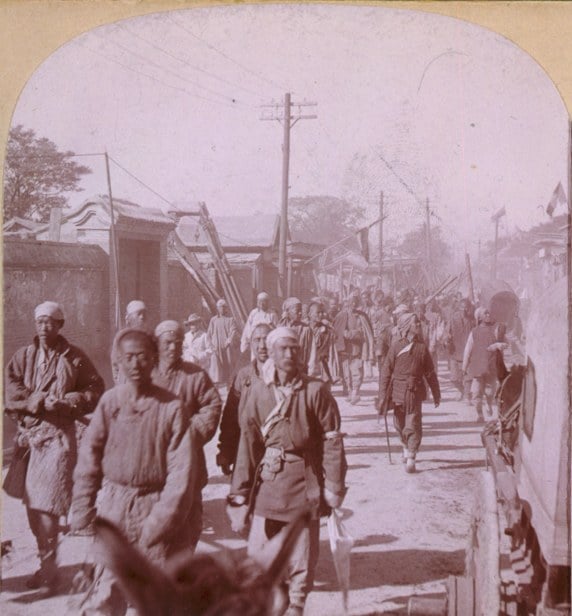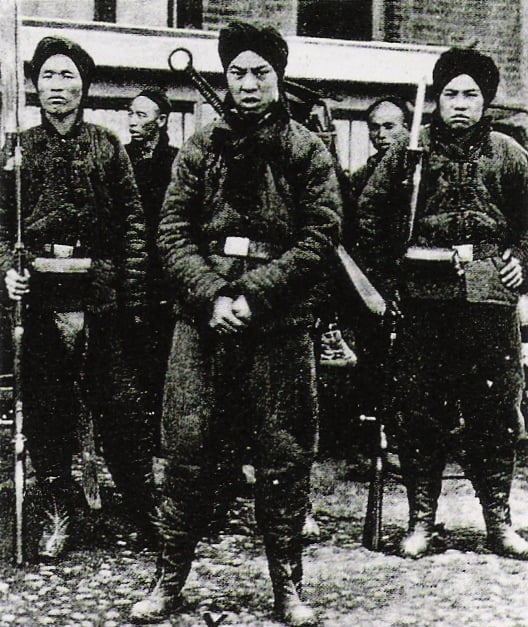Chinese Culture
China is recognized for its strict regulation of religion and culture. Home to more than 1.4 billion people, it is unique in more than one way. Much of its systemic global positioning and political system stems from ancient Chinese values and beliefs, which advocate for an exclusive Chinese identity. The Chinese have historically been protective of their culture and resistant to foreign influence, and a testament to that is the Boxer Rebellion of 1899.
The rebellion, pushed by a secret society often referred to as the “Righteous and Harmonious Fists,” was a revolt against the imperial Chinese government for not protecting the region from influence, encouraging the spread of Christianity in the country, and accommodating their missions, while the local population was unhappy.
The Righteous and Harmonious Fists were a group that practiced martial arts with the belief that they could be spiritually possessed by a higher entity and become undefeatable against foreign weapons. The group was called “Boxers” by foreigners because the martial arts practiced in the region resembled boxing, a popular sport in the West.

The Emergence of the Boxer Rebellion
Under the Qing Dynasty, China faced huge losses in the Sino-Japanese War of 1894, particularly the loss of influence in Korea, which made the locals insecure. Just a few years later, weather conditions worsened. The Yellow River, known as the cradle of ancient Chinese civilization and located in the Kenli County of the Shandong Province, burst, causing flooding in Shandong and other provinces. While the villagers were displeased by the worsening weather conditions which affected employment prospects, the increasing influence of Christian missionaries exacerbated their feelings.
Christianity entered China through the Jesuit missionaries, a group of the Society of Jesus founded in 1540. These missionaries opened the gates for more missionaries in the following two centuries. However, despite the consistent promotion of Christianity, the conversion rate was insubstantial for a large population. After the Second Anglo-Chinese War in 1860—won by Great Britain and France—treaties such as the Treaty of Tienstein and the Convention of Beijing were signed, which, among other things, not only allowed the movement of missionaries but also permitted them to reside in China and engage in buying and selling of land.
As a result, more churches were built, many at the cost of demolishing Chinese worship places, which sowed seeds of hatred and mistrust in the hearts of locals, who now feared cultural imperialism. The locals, including the Boxers, believed that the natural disasters of 1898 were a sign of God’s anger over the spread of Christian missionaries and the message of Christianity in the country.
The displeasure against missionaries and priests was backed by an existing feeling of insecurity caused by the imperial government’s failure to resist the assertion of foreign concessions by the foreign powers. In 1840, the imperial government signed the Treaty of Nanking with the British, which allowed them to establish their treaty ports and stipulated that the British mercantile forces could reside in several cities in China to carry on their trade pursuits.

Subsequently, a supplementary treaty was signed, which was understood to allocate a special settlement to the British envoys. The French also negotiated a similar arrangement with the imperial government and secured a settlement. All this strengthened the mistrust against the Qing dynasty and the empress of that time, Dowager Cixi.
The missionaries were entitled to protection from the government as per Chinese law. Due to this immunity, some abused it to pursue vendettas in courts and government offices. Gangs would claim to be Catholic when caught. Incidents of Christian priests raping Chinese women sparked further outrage among the locals. Amid the tensions, the killing of two German missionaries fueled Emperor Wilhelm II’s ambitions to extend Germany’s imperial goals to China. Subsequently, ownership of major assets such as railways and mines, along with developmental loans, was acquired by Germany.
The lack of response from the Qing government against these events convinced the Boxers that the government was weak against foreigners and hence began a series of attacks on foreigners and Christian missionaries, which transpired into a full-fledged revolt inviting foreign powers to intervene.
The Boxer Revolution
The first proper attack by the Boxers took place in 1898 in Lyunatun Village. The anti-foreign sentiment also grew among Chinese officials, and in 1899, within a year of the first attack, the Boxer Rebellion transpired into a mass movement. The group faced opposition from the Qing government, which fought with armed men at the Senluo Temple due to concerns about stability and reaction from foreign powers. However, the government soon realized that it could share collective goals with the Boxers, i.e. protect China’s sovereignty and culture by eradicating foreign envoys and Christian missionaries.
The Boxers received avid support from Empress Dowager Cixi, and the movement gained support from elites of the imperial court. Subsequently, an official decree was issued encouraging the masses to support the rebellion. However, this meant war. In 1900, on June 20, the Boxers attacked the Peking legation quarter in Beijing, where several legations are now located. Previously, legations did the job that embassies do today, i.e., perform foreign missions. The legations sheltered 900 foreign officials and were besieged by the Boxers.
The Beijing Siege
In response, British Admiral Edward Seymour led 2,000 men to attack the rebels and troops but failed to achieve their purpose as all the railways leading to the city of Beijing were dismembered. Repairing the railways was to no avail, and the forces soon found themselves surrounded and later overrun by Chinese troops and Boxers.

The countries whose officials were besieged by the Boxers formed alliances with other foreign powers and formed an eight-nation partnership comprising France, Germany, Britain, Japan, the United States, Austria-Hungary, Italy, and Russia. On 14 August, the alliance headed straight to Beijing to protect and rescue their officials, and in the course of that, fought the Chinese troops and Boxers at Peking. Japanese troops outnumbered the soldiers of other nations, followed by Russia and Britain. The alliance overcame their opposition and lifted the siege within a day.
Post-Rebellion Effects in China and Globally
The allied forces took hold of the Zhilli province till 1901. The German, Italian, and Russian forces reportedly committed atrocities such as raping daughters and wives of government officials and women in villages, as well as beheading Chinese villagers and carrying out public decapitations. Subsequently, in 1901, the Qing dynasty, to save their reign and the continued rule of Empress Dowager Cixi, reached an agreement with the alliance and signed the Boxer Protocol, which required China to indemnify the alliance with 450 taels of silver over four decades and punish and execute officials who supported the Boxer rebellion.
China also had to give exclusive control of certain areas and routes to foreign troops and ban secret societies and groups promoting anti-foreign sentiment, including the Boxers. The Boxer Protocol put China and the Qing Dynasty in a compromising position and reflected the imperial forces’ inability to defend the country, as well as the courage and credibility of the Qing Dynasty to rule it.
Such feelings lingered for a decade, and during that time, many anti-Qing protests and movements developed to overthrow the imperial government. The Empress Dowager Cixi was looked at as a foreign puppet and no effort of hers changed that image. The Tongmenghui alliance commanded the anti-Qing movement, which took the shape of a revolution and finally, in 1911, the Qing Dynasty fell. The Chinese Communist Party (CCP) has its roots in the Tongmenghui alliance, later known as Kuomintang.
The Boxer Rebellion, followed by the anti-imperialist movements, strengthened the nationalist sentiments of the Chinese. The end of dynastic rule in 1912 resulted in the formation of the Republic of China. Subsequent nationalist movements such as the May Fourth Movement in 1919 laid the groundwork for modernization and pro-sovereignty policies and reforms.
In 1949, the country came to be known as the People’s Republic of China under the leadership of Mao Zedong, who, as one of his initial steps, reclaimed the concessions, refused to conform to unequal treaties with colonial powers, and revoked the extraterritorial privileges of foreigners under the law.
The country subsequently adopted an independent foreign policy devoid of pressures from the United States of America and Russia, nationalized foreign-owned assets and companies, and introduced the Five-Year Plans. The first in 1953 was devoted to decreasing dependence on foreign industries and crops.
Conclusion
Modern China is a reflection of the impact of the Boxer Rebellion. The anti-foreign and pro-nationalist politics of the CCP are rooted in the humiliation China faced at the hands of the foreign powers in the 19th and 20th centuries and is reinforced by the age-old Chinese belief system that advocates for the preservation of an exclusive Chinese identity. The Boxer Revolution reset the course for China and is a significant event in Chinese history.
If you want to submit your articles and/or research papers, please check the Submissions page.
The views and opinions expressed in this article/paper are the author’s own and do not necessarily reflect the editorial position of Paradigm Shift.
Noorulain Shaikh graduated with an LLB (Hons.) degree from the University of London. She is keen on geographical, sociopolitical, and legal aspects of world affairs. She is a published author of articles concerning international law and regional policy affairs.



